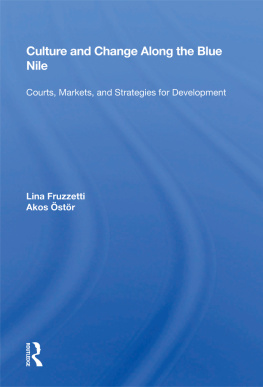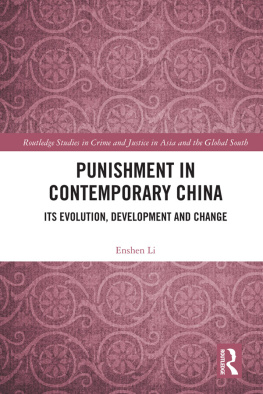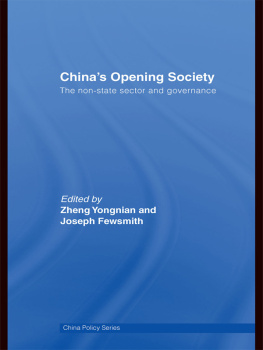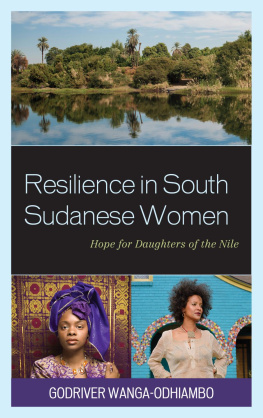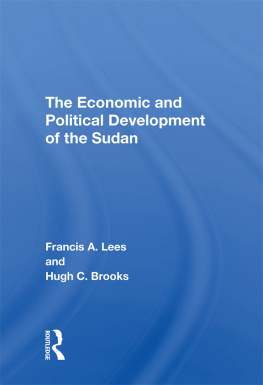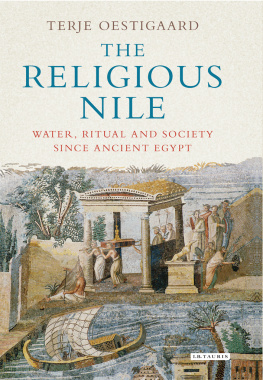First published 1990 by Westview Press
Published 2018 by Routledge
52 Vanderbilt Avenue, New York, NY 10017
2 Park Square, Milton Park, Abingdon, Oxon OX14 4RN
Routledge is an imprint of the Taylor & Francis Group, an informa business
Copyright 1990 by Taylor & Francis
All rights reserved. No part of this book may be reprinted or reproduced or utilised in any form or by any electronic, mechanical, or other means, now known or hereafter invented, including photocopying and recording, or in any information storage or retrieval system, without permission in writing from the publishers.
Notice:
Product or corporate names may be trademarks or registered trademarks, and are used only for identification and explanation without intent to infringe.
Library of Congress Cataloging-in-Publication Data
Fruzzetti, Lina.
Culture and change along the Blue Nile: courts, markets, and
strategies for development/Lina Fruzzetti, kos str.
p. cm.(Westview special studies in applied anthropology)
ISBN 0-8133-7788-9
1. Applied anthropologySudan. 2. Rural developmentSudan.
3. SudanEconomic conditions. 4. Social change. 5. Applied
anthropologyBlue Nile River Valley (Ethiopia and Sudan). 6. Rural
developmentBlue Nile River Valley (Ethiopia and Sudan). 7. Blue
Nile River Valley (Ethiopia and Sudan)Economic conditions.
I. str, kos. II. Title. III. Series.
GN397.7.S73F78 1990
307.1'4'09624dc20
89-14658
CIP
ISBN 13: 978-0-367-01326-4 (hbk)
We spent the summer of 1976 in Khartoum and Damazin/Roseiris discussing the possibility of long range research concerning the cultural aspects of development in a rapidly changing region of the Sudan. This venture was supported by grants from Harvard and Brown Universities. A cooperative, multi-pronged approach took shape and the details of teamwork were planned in 1976 and begun in 1977. We taught at the University of Khartoum from 1977 to 1979 and carried out research in Damazin/Roseiris in cooperation with the University of Khartoum and the Economic and Social Research Council of the Sudan. In November and December of 1977 we spent about five weeks in the field, accompanied by two graduate students from the University of Khartoum. Financial support came from a Ford Foundation grant through the Faculty of Economic and Social Studies. Lina Fruzzetti's part of the work was financed from a grant awarded by the Social Science Research Council (New York) and kos str's work was facilitated by awards from the Milton and Clark Funds of Harvard University. Field research continued in April 1978 when we returned to the South Funj region for over four months of continuous stay. Shorter visits totalling about eight weeks were made between November 1978 and January 1979. These phases of the work were financed from awards made by the Economic and Social Research Council (Khartoum). We carried out further research in the various libraries and institutions of Khartoum, while we were teaching undergraduates and training advanced students in research at the University of Khartoum.
We completed the basic library studies between 1976 and 1979, and we collected the available statistical evidence on the two towns and the region. We found much material in the Central Archives of Khartoum and in the Roseiris Archives now housed in the Rural Council Building in Roseiris.
Fruzzetti studied the People's Courts of Roseiris and Damazin and the Civil Court of Damazin. She observed court proceedings, interviewed court officials, and discussed legal issues with all participants. She studied the nomad-agriculturalist problem through court proceedings. She did research on customary law, law and development, and interviewed administration officials, merchants, nomads, and plaintiffs as well as citizens of the two towns. Later, Fruzzetti was able to carry out a study of the whole rural region as a director or co-director of several social impact studies for the Blue Nile Integrated Agricultural Development Project.
str worked in the markets of Damazin and Roseiris. He made a survey of the two suqs, interviewed about 230 merchants and traders, and collected basic sociological information about the background and origins, manner and pattern of trading, and conduct of business as well as patterns of credit, capital and stocks, and supply and distribution. He followed up the links between the market and administration, discussed government regulation of trade with officials, and worked on the development related aspects of market practices. He studied the mechanized farming system of the region and the trade in food grains. He cooperated with Mahgoub El-Tigani Mahmoud on a study of development administration and government corporations in rural development.
Dr. Mahmoud, then a graduate student at the University of Khartoum, carried out research on administration and bureaucracy in the two towns. His work included a study of provincial administration, local government, and the functioning of departments, agencies, and corporations. He interviewed over 200 officials and observed day-to-day governmental activities. He followed up the links between the officials and the town and rural councils and started research on officials as a society in the two towns. He collected basic sociological information about government employees and also worked on the administration of the current development effort.
In addition to these separate but related tasks we have made several joint trips to the villages along both sides of the river. We visited the Ingessana Hills, Keili, and Kurmuk several times. In 1978 str made a trip to Bikori and Geissan. We traveled to the Abu Gumai/Abu Sheneina and Jebel Agadi area on numerous occasions. Repeated journeys between Khartoum and Damazin/Roseiris by air, rail, and road throughout the 1960s, 70s, and 80s have helped us become aware of settlement and cultivation patterns, ethnic composition, ecology, economy, and communications in much of the Blue Nile Province.

